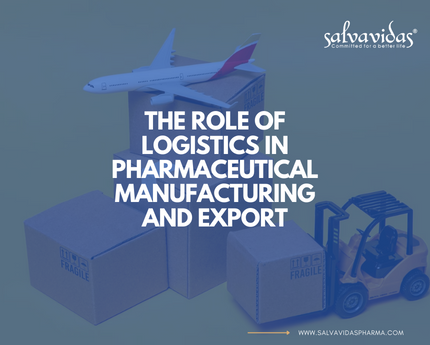
The Role of Logistics in Pharmaceutical Manufacturing and Export
The pharmaceutical industry is a complex and ever-evolving sector that requires the seamless coordination of multiple processes, from manufacturing to delivery. One critical aspect of this is logistics, which plays a significant role in ensuring the timely and efficient delivery of drugs and other pharmaceutical product. In this article, we will explore the role of logistics in pharmaceutical manufacturing and export and how it affects the entire supply chain.
Introduction to The Role of Logistics in Pharmaceutical Manufacturing and Export
The pharmaceutical industry is responsible for producing, distributing, and delivering drugs and other healthcare products to customers all over the world. With the increasing demand for pharmaceutical products and the globalization of the industry, it has become imperative for companies to have a reliable logistics system in place. The logistics system must ensure that the products are manufactured, stored, and transported in a timely and efficient manner, meeting the standards and regulations set by regulatory bodies such as the FDA and the World Health Organization (WHO).
Importance of Logistics in Pharmaceutical Manufacturing
In the manufacturing process of pharmaceutical products, logistics plays a crucial role in ensuring the timely delivery of raw materials, components, and finished products. It is responsible for the smooth flow of materials and products from one stage of the manufacturing process to the next. A well-designed logistics system can help companies reduce production downtime, minimize waste, and optimize production processes.
Challenges in Pharmaceutical Logistics
Despite its importance, the logistics of the pharmaceutical industry are faced with numerous challenges that can impact the entire supply chain. Some of the common challenges faced by the industry include:
- Temperature control: Many pharmaceutical products are temperature-sensitive and require a controlled environment during storage and transportation. Logistics companies must have proper storage facilities and transportation methods to maintain the temperature of these products.
- Regulatory compliance: The pharmaceutical industry is heavily regulated, and logistics companies must comply with regulations such as the FDA’s Good Manufacturing Practices (GMP) and the WHO’s Good Distribution Practices (GDP).
- Security: Pharmaceutical products are high-value items and are often targeted by thieves. Logistics companies must ensure the security of these products during storage and transportation.
- Timeliness: The delivery of pharmaceutical products is time-sensitive, and logistics companies must ensure that the products are delivered on time and in the correct condition.
The Role of Logistics in Pharmaceutical Export
In addition to the logistics involved in the manufacturing process, logistics also plays a crucial role in the export of pharmaceutical products. The export process requires the coordination of multiple parties, including manufacturers, customs, and freight forwarders. Logistics companies must ensure that the products are transported in compliance with the regulations of both the exporting and importing countries. They must also ensure that the products are delivered in a timely manner and in the correct condition.
Benefits of Efficient Logistics in the Pharmaceutical Industry
An efficient logistics system can bring numerous benefits to the pharmaceutical industry, including
- Improved customer satisfaction: An efficient logistics system can help companies meet customer demands and improve customer satisfaction.
- Reduced production costs: By optimizing the flow of materials and products, companies can reduce production costs and increase profitability.
- Improved regulatory compliance: An efficient logistics system can help companies comply with regulations, reducing the risk of regulatory penalties.
- Increased competitiveness: An efficient logistics system can help companies compete with other companies in the industry, increasing their competitiveness.
Frequently Asked Questions about the Role of Logistics in Pharmaceutical Frequently Asked Questions about The Role of Logistics in Pharmaceutical Manufacturing and Export
Q. What is the role of logistics in the pharmaceutical industry?
A. The role of logistics in the pharmaceutical industry is to ensure the timely and efficient delivery of raw materials, components, finished products, and exports. It plays a crucial role in the manufacturing process and helps companies meet customer demands, comply with regulations, reduce production costs, and increase competitiveness.
Q. Why is logistics important in the pharmaceutical industry?
A. Logistics is important in the pharmaceutical industry because it affects the entire supply chain, from manufacturing to delivery. An efficient logistics system can help companies meet customer demands, comply with regulations, reduce production costs, and increase competitiveness.
Q. What are the challenges faced by the pharmaceutical industry in logistics?
A. The pharmaceutical industry is faced with numerous challenges in logistics, including temperature control, regulatory compliance, security, and timeliness. Logistics companies must have proper storage facilities, transportation methods, and security measures in place to overcome these challenges.
Q. How does the role of logistics in pharmaceutical export impact the industry?
A. The role of logistics in pharmaceutical export impacts the industry by ensuring that the products are transported in compliance with the regulations of both the exporting and importing countries. It helps companies meet the demands of customers and ensures that the products are delivered in a timely and efficient manner.
Conclusion
In conclusion, logistics plays a vital role in the pharmaceutical industry, from manufacturing to export. It affects the entire supply chain and is responsible for ensuring the timely and efficient delivery of drugs and other pharmaceutical products. Companies must have a reliable logistics system in place to meet customer demands, comply with regulations, reduce production costs, and increase competitiveness. The pharmaceutical industry must continuously adapt and overcome the challenges faced in logistics to maintain the highest standards in the production and delivery of healthcare products.




0